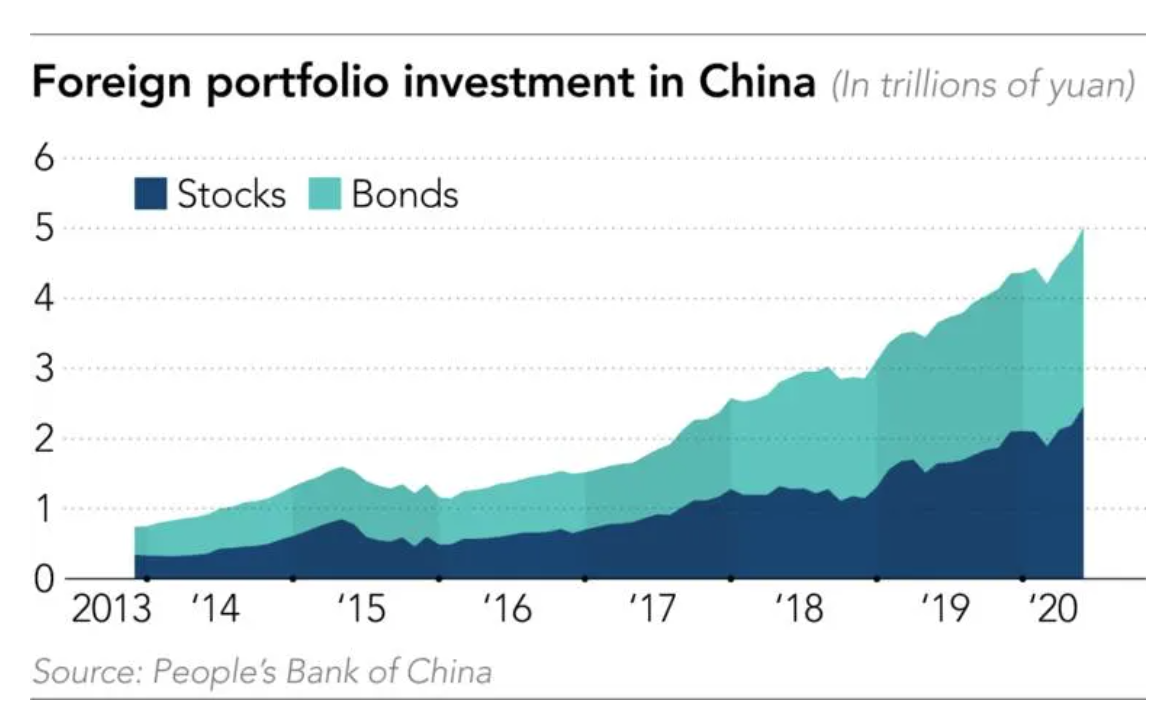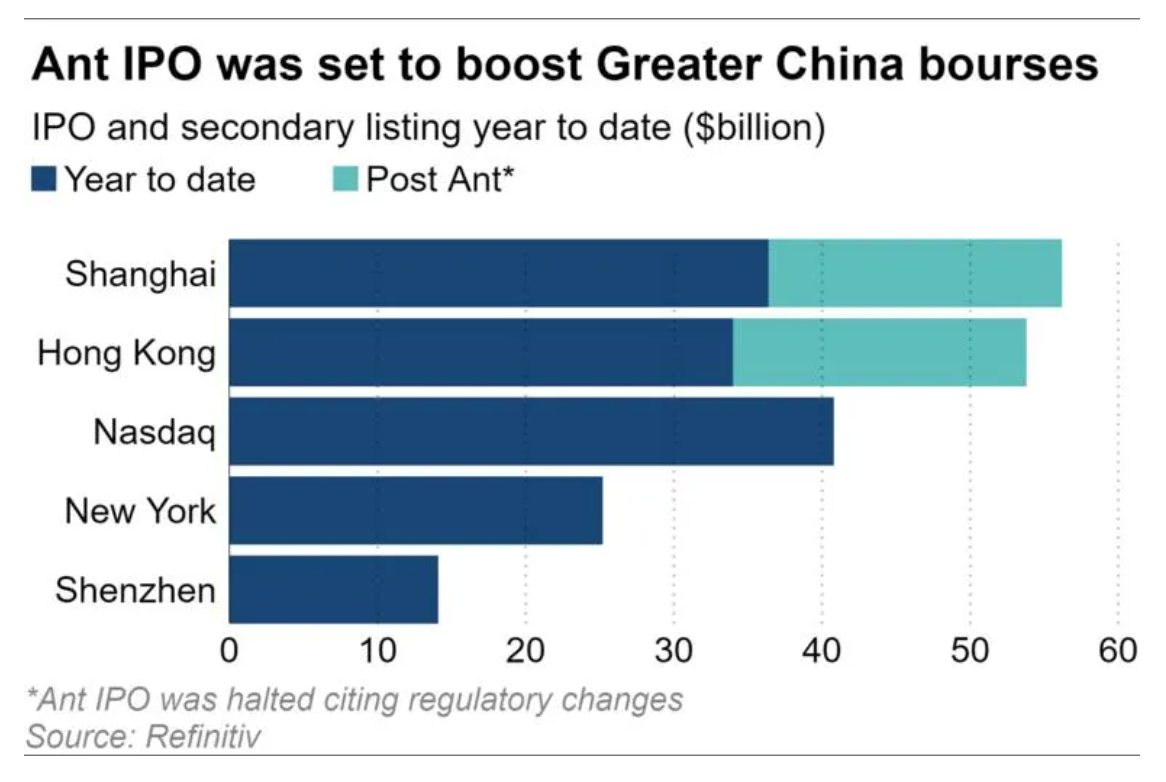Global investors are taking two distinct messages from the sudden termination of Ant Group’s initial public offering — billed as the world’s largest — by Chinese regulators.
First, controlling financial risk in the world’s No. 2 economy is clearly a top priority for Beijing. Second, a transparent regulatory environment of the sort needed to make Shanghai into a premier financial center remains a work in progress.
As the shock wears off, Ant’s would-be investors are trying to understand the secondary impacts from the abrupt halt of the share offering, which had been set to raise as much as USD 39.6 billion. The IPO was suspended two days before it was scheduled to take place on Nov. 5.
“By suspending Ant’s IPO at the last minute and publicly reprimanding its founder Jack Ma, China’s financial regulators have demonstrated there is still a force more powerful than the coming wave of financial innovation: the state,” said Andrew Batson, China research director at Gavekal Research.
Four global fund managers, who bid for Ant shares and declined to be named, told Nikkei Asia that they might have underestimated the power Beijing can wield. However, none yet plans to reduce allocations to China. They also said recent regulatory changes would boost China’s financial stability.
Ant’s listing was supposed to herald the coming of age of “greater China” capital markets in Shanghai and Hong Kong as the country further opens up its USD 50 trillion financial sector.
Instead, investors are asking whether regulatory volatility might affect China’s aim of bringing more foreign investment into its capital markets, as well as the prospect of more “homecoming listings” — that is, US-listed Chinese companies moving their stock market listings back to China amid tensions with Washington.

“The drama associated with Ant was a display of power by China’s top echelons,” said one of the fund managers. “They set the agenda and it doesn’t matter if they have to lose face in the world stage. It was the timing that was shocking, not the regulation by any means.”
Ant, a virtual financial mall selling everything from loans, to wealth management, to insurance, announced its IPO intentions in July. The affiliate of Alibaba Group Holding filed a preliminary application in August. By October it had all regulatory approvals and, according to people familiar with its plans, the blessing of the People’s Bank of China, the central bank.
While regulators unveiled a series of rule changes over the past two months focused on enhancing capital ratios for online lenders such as Ant, almost no one expected the cancellation of the IPO.
“Avoiding a hasty listing against significant change in [the] regulatory environment is in line with the responsibilities of market regulators towards investors and markets, and demonstrates reverence for the market and the rule of law,” China’s securities regulator said in a statement on Wednesday. “In the long run, this decision will certainly enhance sound development of China’s capital markets, and build stronger trust and confidence of domestic and overseas investors in them.”
The new rules are another sign of Beijing’s desire to safeguard the world’s largest banking system amid rising levels of bad debt. Some small lenders have been forced into government rescues despite years of effort by authorities to unwind shadow banking, sell bad loans, promote mergers, pump in capital and restructure high-risk institutions.
Analysts said financial services companies were likely to reexamine some of their assumptions about the regulatory environment as they invest in China.
Global capital inflows into Chinese assets surged after the country last year removed the ceiling on foreign investors’ purchases of stocks and bonds. Regulators in September revealed plans to widen the scope of investments allowed under a program linking the stock exchange in Hong Kong with its counterpart in Shanghai, China’s financial hub, and to allow foreign investors to trade more commodities futures products.
Wall Street titans, including JPMorgan Chase, which was a sponsor of the Hong Kong leg of Ant’s IPO, have moved to take full ownership of ventures in the country. And the likes of Credit Suisse and Goldman Sachs have revealed plans to double head count in some businesses in a boost for Shanghai.
Shanghai’s crown jewel is its Nasdaq-style Star Market, which was mooted by President Xi Jinping in the middle of the trade war with the US to give local startups an alternative to listing abroad. Since Star’s launch last year, almost 200 companies have raised more than USD 40 billion, according to data from Dealogic.

Ant would have burnished the reputation of the fledgling exchange and given further confidence to the hundreds of US-listed Chinese companies looking for a listing closer to home as tensions between the two largest economies mount.
In the past decade, 204 Chinese companies, including Alibaba, have raised almost USD 68 billion on the New York Stock Exchange and Nasdaq. While some, including Alibaba and JD.com, have undertaken a secondary listing in Hong Kong, only another three dozen companies are eligible for a similar move under local exchange rules, leaving others to weigh an alternative home.
The volatility in regulation could have a “modest impact” on the plans of Chinese companies eyeing listings in the market, though trade and US-China relations will play a bigger role, said Andrew Collier, managing director of Hong Kong-based Oriental Capital Research and previously president of Bank of China International-US.
“The worst aspect of the Ant fiasco is the apparent disarray in financial decision-making within the country,” he said. “Global investors will have a more cautious attitude toward China regarding future investment. This will affect pricing.”
However, the potential for outsized returns in China, powered by economic expansion and wealth creation, would continue to draw global investment, analysts said.
The economy can double in size by 2035, President Xi said in a speech made public this month explaining the ruling Communist Party’s five- and 15-year economic goals.
China is on course to be the only major economy to grow in 2020. A Reuters poll of economists in late October projected growth will surge to 8.4% in 2021, as the global economy recovers from the health crisis.
The Ant “event will surely make foreign investors more wary of making investments in China, going forward,” said Tianlei Huang, research analyst at the Peterson Institute for International Economics in Washington.
However, Huang said: “Chinese assets, in today’s low-yield world, are particularly attractive to international investors. This is truly a love and hate story, and foreign investors, going forward, will have no choice but to adapt to this peculiar regulatory environment in China.”
This article first appeared on Nikkei Asia. It’s republished here as part of 36Kr’s ongoing partnership with Nikkei.
